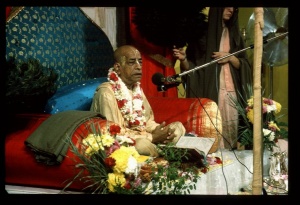SB 8.16.11: Difference between revisions
m (1 revision(s)) |
No edit summary |
||
| Line 1: | Line 1: | ||
{{info | {{info | ||
|speaker=Aditi, | |speaker=Aditi, wife of Kaśyapa Muni | ||
|listener= | |listener=Kaśyapa Muni | ||
}} | }} | ||
[[Category:Srimad-Bhagavatam - Canto 08 Chapter 16]] | |||
[[Category:Bhagavatam Verses Spoken by Aditi, Kasyapa Muni's wife - Vanisource|081611]] | |||
<div style="float:left">'''[[Srimad-Bhagavatam]] - [[SB 8|Eighth Canto]] - [[SB 8.16: Executing the Payo-vrata Process of Worship|Chapter 16: Executing the Payo-vrata Process of Worship]]'''</div> | |||
<div style="float:right">[[File:Go-previous.png|link=SB 8.16.10]] '''[[SB 8.16.10]] - [[SB 8.16.12]]''' [[File:Go-next.png|link=SB 8.16.12]]</div> | |||
{{RandomImage}} | |||
==== TEXT 11 ==== | ==== TEXT 11 ==== | ||
<div | <div class="verse"> | ||
śrī-aditir uvāca | :śrī-aditir uvāca | ||
bhadraṁ dvija-gavāṁ brahman | :bhadraṁ dvija-gavāṁ brahman | ||
dharmasyāsya janasya ca | :dharmasyāsya janasya ca | ||
tri-vargasya paraṁ kṣetraṁ | :tri-vargasya paraṁ kṣetraṁ | ||
gṛhamedhin gṛhā ime | :gṛhamedhin gṛhā ime | ||
</div> | </div> | ||
| Line 18: | Line 23: | ||
==== SYNONYMS ==== | ==== SYNONYMS ==== | ||
<div | <div class="synonyms"> | ||
śrī-aditiḥ | ''śrī-aditiḥ uvāca''—Śrīmatī Aditi said; ''bhadram''—all auspiciousness; ''dvija-gavām''—of the brāhmaṇas and the cows; ''brahman''—O brāhmaṇa; ''dharmasya asya''—of the religious principles mentioned in śāstra; ''janasya''—of the people in general; ''ca''—and; ''tri-vargasya''—of the three processes of elevation (dharma, artha and kāma); ''param''—the supreme; ''kṣetram''—field; ''gṛhamedhin''—O my husband, who are attached to household life; ''gṛhāḥ''—your home; ''ime''—all these things. | ||
</div> | </div> | ||
| Line 25: | Line 30: | ||
==== TRANSLATION ==== | ==== TRANSLATION ==== | ||
<div | <div class="translation"> | ||
Aditi said: O my respected brāhmaṇa husband, all is well with the brāhmaṇas, the cows, religion and the welfare of other people. O master of the house, the three principles of dharma, artha and kāma flourish in household life, which is consequently full of good fortune. | Aditi said: O my respected brāhmaṇa husband, all is well with the brāhmaṇas, the cows, religion and the welfare of other people. O master of the house, the three principles of dharma, artha and kāma flourish in household life, which is consequently full of good fortune. | ||
</div> | </div> | ||
| Line 32: | Line 37: | ||
==== PURPORT ==== | ==== PURPORT ==== | ||
<div | <div class="purport"> | ||
In household life one can develop the three principles of religion, economic development and sense gratification according to the regulations given in the śāstras, but to attain liberation one must give up household life and place himself in the transcendental renounced order. Kaśyapa Muni was not in the renounced order of life. Therefore he is addressed here once as brahman and another time as gṛhamedhin. Aditi, his wife, assured him that as far as household life was concerned, everything was going nicely, and the brāhmaṇas and cows were being honored and protected. In other words, there were no disturbances; household life was duly progressing. | In household life one can develop the three principles of religion, economic development and sense gratification according to the regulations given in the ''śāstras'', but to attain liberation one must give up household life and place himself in the transcendental renounced order. Kaśyapa Muni was not in the renounced order of life. Therefore he is addressed here once as ''brahman'' and another time as ''gṛhamedhin''. Aditi, his wife, assured him that as far as household life was concerned, everything was going nicely, and the ''brāhmaṇas'' and cows were being honored and protected. In other words, there were no disturbances; household life was duly progressing. | ||
</div> | </div> | ||
__NOTOC__ | |||
<div style="float:right; clear:both;">[[File:Go-previous.png|link=SB 8.16.10]] '''[[SB 8.16.10]] - [[SB 8.16.12]]''' [[File:Go-next.png|link=SB 8.16.12]]</div> | |||
__NOTOC__ | |||
__NOEDITSECTION__ | |||
Revision as of 02:51, 1 July 2021

A.C. Bhaktivedanta Swami Prabhupada
TEXT 11
- śrī-aditir uvāca
- bhadraṁ dvija-gavāṁ brahman
- dharmasyāsya janasya ca
- tri-vargasya paraṁ kṣetraṁ
- gṛhamedhin gṛhā ime
SYNONYMS
śrī-aditiḥ uvāca—Śrīmatī Aditi said; bhadram—all auspiciousness; dvija-gavām—of the brāhmaṇas and the cows; brahman—O brāhmaṇa; dharmasya asya—of the religious principles mentioned in śāstra; janasya—of the people in general; ca—and; tri-vargasya—of the three processes of elevation (dharma, artha and kāma); param—the supreme; kṣetram—field; gṛhamedhin—O my husband, who are attached to household life; gṛhāḥ—your home; ime—all these things.
TRANSLATION
Aditi said: O my respected brāhmaṇa husband, all is well with the brāhmaṇas, the cows, religion and the welfare of other people. O master of the house, the three principles of dharma, artha and kāma flourish in household life, which is consequently full of good fortune.
PURPORT
In household life one can develop the three principles of religion, economic development and sense gratification according to the regulations given in the śāstras, but to attain liberation one must give up household life and place himself in the transcendental renounced order. Kaśyapa Muni was not in the renounced order of life. Therefore he is addressed here once as brahman and another time as gṛhamedhin. Aditi, his wife, assured him that as far as household life was concerned, everything was going nicely, and the brāhmaṇas and cows were being honored and protected. In other words, there were no disturbances; household life was duly progressing.